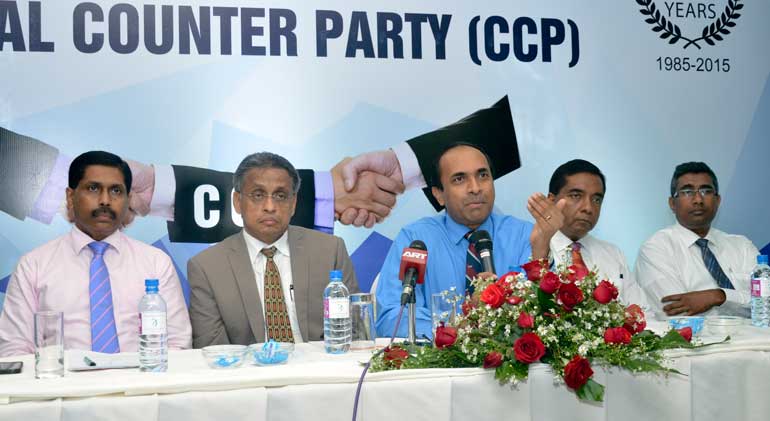Wednesday Feb 18, 2026
Wednesday Feb 18, 2026
Monday, 30 November 2015 00:00 - - {{hitsCtrl.values.hits}}
 CSE Chief Operating Officer Renuke Wijayawardhane, CSE Chairman Vajira Kulatilaka, CSE CEO Rajeeva Bandaranaike, CSE Enterprise Risk Managment Assistant General Manager Lalin Paranavitana, CSE Head of IT Project Management Buvaneka Charitha Dumbukola
CSE Chief Operating Officer Renuke Wijayawardhane, CSE Chairman Vajira Kulatilaka, CSE CEO Rajeeva Bandaranaike, CSE Enterprise Risk Managment Assistant General Manager Lalin Paranavitana, CSE Head of IT Project Management Buvaneka Charitha Dumbukola
By Shehan Dain
The Colombo Stock Exchange (CSE) is set to undergo a systemic makeover when a new Central Counter Party (CCP) is established to attract foreign investors to the derivative market platform.
This institution, which is proposed to be up and running by early 2017, will be a fully-owned subsidiary of the CSE.
CCP, a globally accepted stock market methodology, is expected to comfort investors and guarantee settlement of cash and delivery of securities for all secondary market transactions at the CSE. Ultimately the institution will act as a buyer for sellers and vice versa, significantly mitigating the risk of default.
Speaking at the event, CSE Chairman Vajira Kulatilaka said: “When CCP comes in we can sell derivatives hereafter. This was the only part that was lagging for us to start new products. This will improve foreign investors’ opportunities to get exposure to the country without price increases. So liquidity will improve immediately. We will be launching derivatives just after the CCP comes in and we have already started the work that’s needed to do this.”
Presently for equity securities the delivery of shares from the seller to the buyer occurs immediately upon execution of the share transaction while the fund settlement to the seller takes place only after three market days from the transaction date, thus exposing the seller to a three-day settlement risk.
According to CSE CEO Rajeeva Bandaranaike, the total investment value stands at Rs. 600 million of which Rs. 100 million has already been utilised as consultancy fees for the project.
In case of a risk, the guaranteed fund of the CCP currently stands at Rs. 750 million. The contributions were provided by the SEC, CSE and Ministry of Finance. Since the establishment of the fund in 1998, the SEC and CSE contributed Rs. 100 million, whereas the Government contributed Rs. 50 million. Through reinvestment the fund has expanded and is deemed adequate if a market crash occurs.
“We have done stress testing and we have found that according to the current volumes this fund is adequate for a default. What one has to understand is if there is a default the share is still there, you can always sell the share and recover. It’s the price risk that has to be recovered. So that fund will cover the fund risk. After the CCP is in place we will take a margin from every transaction which will defray the price of the share,” said Bandaranaike.
He also highlighted that foreign investors would benefit from the CCP more than retail investors.
“This will actually impact foreign investors more than retail investors because settlement default will more likely come from large trade than smaller trade. They are the people who are keener on a CPP system.”
The consultants selected for the project are BTA Consulting (BTA) of the United Kingdom. The firm will provide consultancy and project management services for the creation of the clearing house.
BTA Consulting is a UK-based consultancy firm specialising in capital market related assignments globally, having specialists with exposure to most global capital markets.
The consultancy is being jointly funded by the CSE and SEC and the Central Bank of Sri Lanka also funded a third of the consultancy fees for the initial phase. The infrastructure and IT systems will be made by the CSE.
“While up to now there has been no default of payment at the CSE for 30 years, having an individual party to guarantee every transaction will definitely bring that comfort factor and is the globally accepted way. It will also bring anonymity of trading. Currently, if somebody buys or sells shares the next day it’s in the papers which some don’t like. But here when trading happens brokers need not know what’s happening on the other side,” added Bandaranaike.
The CCP project, which commenced in 2014 with the commissioning of the new Central Depository System, moved to its second phase in 2015 with the development of a new Broker Back Office (BBO) systems and Order Management Systems (OMS) which will be commissioned in full by March 2016. The CCP project will now move into its third phase in December 2015, with the incorporation of a separate institution for the purpose of guaranteeing settlement, and commence procurement of the necessary IT infrastructure and systems and the formulation of the rules, regulations and legislation to enable CCP.
Bandaranaike also commented on the amendment to the SEC Act, which was vital to enable CCP.
“Concurrently we’re doing the legal and regulatory work as well and for that the SEC Act should be amended so that we can finalise transactions and bring banks into the system which is needed for a CCP to operate. The SEC Act is being amended now in totality and CCP will form a significant part of it.”